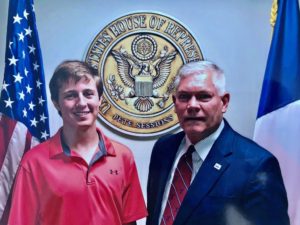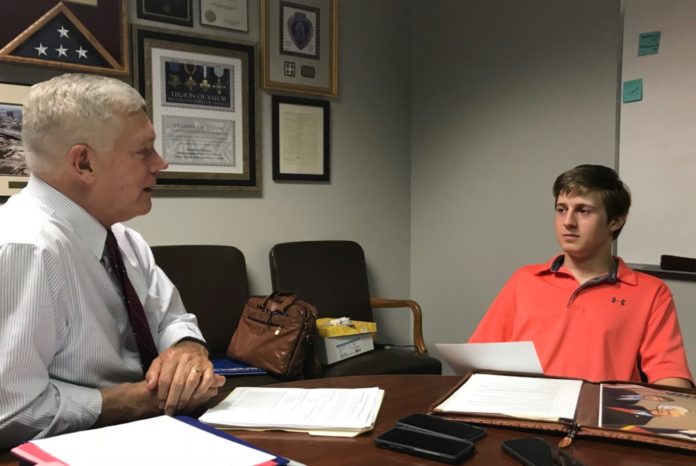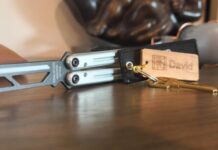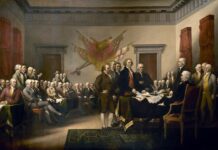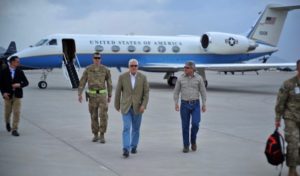
Leadership. Our world seems in critical need of good leaders. Do you ever wonder where our journey out into the world will lead us? How will we become productive citizens and make a positive impact as leaders?
I was fortunate enough to be given the opportunity to intern for Congressman Pete Sessions in Washington D.C. While I was low man on the totem pole, I learned about how our government works, what it’s like to put in a solid 10 hour day, and even some valuable lessons about office politics!
I had the opportunity to interview Congressman Session recently. I’m not here to make any political endorsement. I was just looking for advice from a leader about leadership. He spoke candidly about his background, what he believes it takes to become a good leader, and some important people and moments in his life that have shaped his beliefs.
Who were your mentors as a young man?
“My father was a my mentor. He was an enormous father figure but not overbearing or heavy handed. He treated us like great friends. He was a cool dad. We had an enormous respect for him and my brothers and I wanted to emulate him in lots of ways. He was an Eagle Scout. I liked the way he talked to people and treated them. I always thought of him as a leader. He always aimed for the best. He went high; not low. Nothing was ever personal. He encouraged you to keep your goals and objectives in front of you. He was a Federal Judge for 14 years and FBI Director under President Reagan, President Bush and President Clinton.”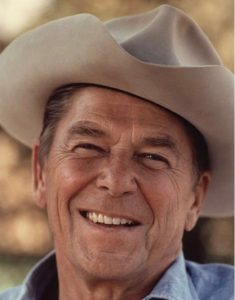
“Another mentor of mine was Ronald Reagan. I became aware of him in 1975 when I was a sophomore in college and started studying his writings and paying close attention to him. He was a larger than life hero that began growing on me and I think much of the country. He became a figure that we even quote today as conservative Republicans.”
Why did you enter politics?
“I spent a 17 year career at AT&T and moved 7 different places. I then became Chairman of the Board of the Greater East Dallas Chamber of Commerce. I felt that the east side of Dallas was not being represented by the actual content of the people as a conservative district. It was represented by someone who didn’t represent the ideas I believed in, so I ran for Congress.”
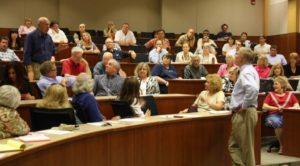
What essential qualities do you think are required for a politician to be an effective leader?
“Know yourself and your responsibilities. Where you’re going and how your going to achieve your goals. It’s important to have a written plan to be able to express those goals. To serve other people and put forth ideas and concepts that are good for other people and their future.”
If you weren’t serving in Congress, what other career might have interested you?
“The military or law enforcement. Likely the Marines, as I tend to see things as walking uphill as opposed to walking downhill. I like challenges and fighting for one’s convictions.”
What are two things most people don’t know about you?
“I ran track through college.”
“I’m a former Eagle Scout and I love the mountains; especially in New Mexico. That’s where i really enjoy spending time with my boys.”
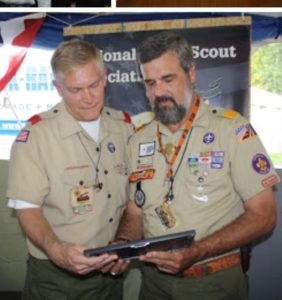 I understand you have a special needs son, Alex. Can you tell me about him?
I understand you have a special needs son, Alex. Can you tell me about him?
“Alex is a cool guy. He’s a 24 year old young man and an Eagle Scout. He’s a great swimmer too. He’s really good at swimming the butterfly. He works at Home Depot. He’s very special to me. He’s a product of God. He’s a product of his mom — that’s done some awesome things with him. I’ll take credit for some things, but moms tend to give you so much more.”

What is the easiest part of your job and the hardest part of your job?
“The easiest part of my job is getting fired up to do it!”
“The hardest part of my job is getting on a plane to fly up to Washington Sunday evenings. I spend many hours a week travelling. It’s easy to fly back.”
Why are approval ratings so low? Why is that and what can be done to improve things?
“People need to receive feedback. Sometimes approval ratings have a lot to do with that. I think public opinion is stronger than approval ratings. If you ask people what they think of a leader as opposed to netting it out: Are you for him or against him?” I think a lot of people have redeeming qualities beyond the approval ratings.”
How will this years election differ from other prior elections?
“This year’s election will be the most expensive race in the country. All eyes are on Texas. The district has changed dramatically. There’s a lot at stake. Dallas is now home to tens of thousands of people that were not here just two years ago. They’ve moved from other regions of the country.”
I understand that you Chair the Armed Services Academy Selection Committee. How do you suggest if someone is interested in serving how they can get involved?
“I think discipline and reality are the two most important qualities — including a dose of history is very important. Discipline will focus you on understanding and seeing things for what they are. The reality part is deciding ‘do you fit?’ The mission will always out there. Some people may believe they want to serve, but when the commitment date nears — it’s hard. It takes real maturity to make this kind of a choice.”
Academy nominations from Jesuit recommended by Congressman Sessions:
Nicholas Smith, Jesuit 2003 – USMMA Class of 2007
Kai Anthony, Jesuit 2005 – USAFA Class of 2009
Scott James, 2006 – USNA Class of 2010
Andy Ogden, Jesuit 2009 – USNA Class 2014
Eamonn Crumblish Jesuit 2010 – USNA Class of 2015
Brendan Metcalf, Jesuit 2012 – USNA Class of 2017
David Porter, Jesuit 2013 – USNA Class of 2018
Cory Hazelbaker, Jesuit 2014 – USMA Class of 2018
Nicholas Ready, Jesuit 2015 – USAFA Class of 2019
Michael Boyson, Jesuit 2016 – USNA Class of 2020
Pryor Miller, Jesuit 2016 – USCGA Class of 2020
Vance Holub, Jesuit 2017 – USAFA Class of 2021
Samuel Olden, Jesuit 2017 – USNA Class of 2021
How can citizens be more encouraged to participate in the election process?
“I think if you explain to people what’s at risk or what the gain would be; the yield. People would be willing to put their name on something they’re willing to vote for it. I think most people see where they have a reason to be for something. Whether it’s a negative or positive view — it’s still what’s important to them; and what drives them. We need to understand that. And we need to be honest and candid about what you are and what you stand for. Then you can perform in that behavior.”
How can those not of voting age make a difference?
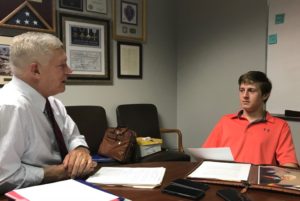
“Do it everyday. Smile at somebody. Open the door for someone. In scouting we have a saying: “Do a good turn daily”. That means go out of your way to be great! There’s an amazing number of ways that young people can grow up to be not only better citizens but really help people.”
If you could have any historic figures at your dinner table, who would you invite?
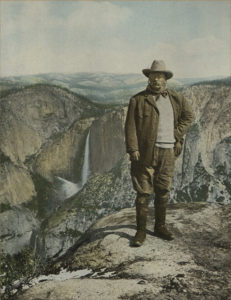
“Teddy Roosevelt – He had a view of setting aside vast amounts of our country’s wilderness and yet he shot numerous wildlife. I think he had some sense of balance and I’d like to know how he saw the world.
Tom Landry (Dallas Cowboys Coach) – He was a very stoic man, a smart and intuitive guy. A deep thinker and very cautious. I’d like to know if he ever dreamed deep and big; and if he ever let himself out and gained exhilaration or were always deep and inward? I’d also like to have Thomas Jefferson, John Wayne and Harry Houdini.”
Jesuit’s motto is “Men for Others.” What does that mean to you and what advice would you give the the students of Jesuit?
“You will soon leave where you are. You don’t know this yet, but you’re getting ready to be kicked out of the house. Part of Jesuit’s job is to begin preparation for your life. To help you to steer you. To enable you. To be prepared. I don’t know when you go out the door what’s out there, but you’d better be prepared to lead. To do it the best way possible and that’s what the challenge is.”
